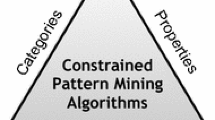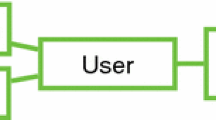Abstract
Multi-relational data mining (MRDM) is to enumerate frequently appeared patterns in data, the patterns which are appeared not only in a relational table but over a collection of tables. Although a database usually consists of many relational tables, most of data mining approaches treat patterns only on a table. An approach based on ILP (inductive logic programming) is a promising approach and it treats patterns on many tables. Pattern miners based on the ILP approach produce expressive patterns and are wide-applicative but computationally expensive. MAPIX[2] has an advantage that it constructs patterns by combining atomic properties extracted from sampled examples. By restricting patterns into combinations of the atomic properties it gained efficiency compared with other algorithms. In order to scale MAPIX to treat large dataset on standard relational database systems, this paper studies implementation issues.
Access this chapter
Tax calculation will be finalised at checkout
Purchases are for personal use only
Preview
Unable to display preview. Download preview PDF.
Similar content being viewed by others
References
Dehaspe, L., De Raedt, L.: Mining Association Rules in Multiple Relations. In: Džeroski, S., Lavrač, N. (eds.) ILP 1997. LNCS (LNAI), vol. 1297, pp. 125–132. Springer, Heidelberg (1997)
Motoyama, J., Urazawa, S., Nakano, T., Inuzuka, N.: A Mining Algorithm Using Property Items Extracted from Sampled Examples. In: Muggleton, S.H., Otero, R., Tamaddoni-Nezhad, A. (eds.) ILP 2006. LNCS (LNAI), vol. 4455, pp. 335–350. Springer, Heidelberg (2007)
Inuzuka, N., Motoyama, J., Urazawa, S., Nakano, T.: Relational pattern mining based on equivalent classes of properties extracted from samples. In: Washio, T., Suzuki, E., Ting, K.M., Inokuchi, A. (eds.) PAKDD 2008. LNCS (LNAI), vol. 5012, pp. 582–591. Springer, Heidelberg (2008)
Agrawal, R., Srikant, R.: Fast Algorithms for Mining Association Rules in Large Databases. In: VLDB, pp. 487–499 (1994)
Rouveirol, C.: Extensions of Inversion of Resolution Applied to Theory Completion. In: Inductive Logic Programming, pp. 63–92. Academic Press, London (1992)
Sarawagi, S., Thomas, S., Agrawal, R.: Integrating Association Rule Mining with Relational Database Systems: Alternatives and Implications. In: SIGMOD, pp. 343–354 (1998)
Inuzuka, N., Makino, T.: Implementing Multi-relational Mining with Relational Database Systems. In: Velásquez, J.D., Ríos, S.A., Howlett, R.J., Jain, L.C. (eds.) KES 2009. LNCS, vol. 5712, pp. 123–128. Springer, Heidelberg (2009)
Author information
Authors and Affiliations
Editor information
Editors and Affiliations
Rights and permissions
Copyright information
© 2010 Springer-Verlag Berlin Heidelberg
About this paper
Cite this paper
Inuzuka, N., Makino, T. (2010). Multi-Relational Pattern Mining System for General Database Systems. In: Setchi, R., Jordanov, I., Howlett, R.J., Jain, L.C. (eds) Knowledge-Based and Intelligent Information and Engineering Systems. KES 2010. Lecture Notes in Computer Science(), vol 6278. Springer, Berlin, Heidelberg. https://doi.org/10.1007/978-3-642-15393-8_9
Download citation
DOI: https://doi.org/10.1007/978-3-642-15393-8_9
Publisher Name: Springer, Berlin, Heidelberg
Print ISBN: 978-3-642-15392-1
Online ISBN: 978-3-642-15393-8
eBook Packages: Computer ScienceComputer Science (R0)




